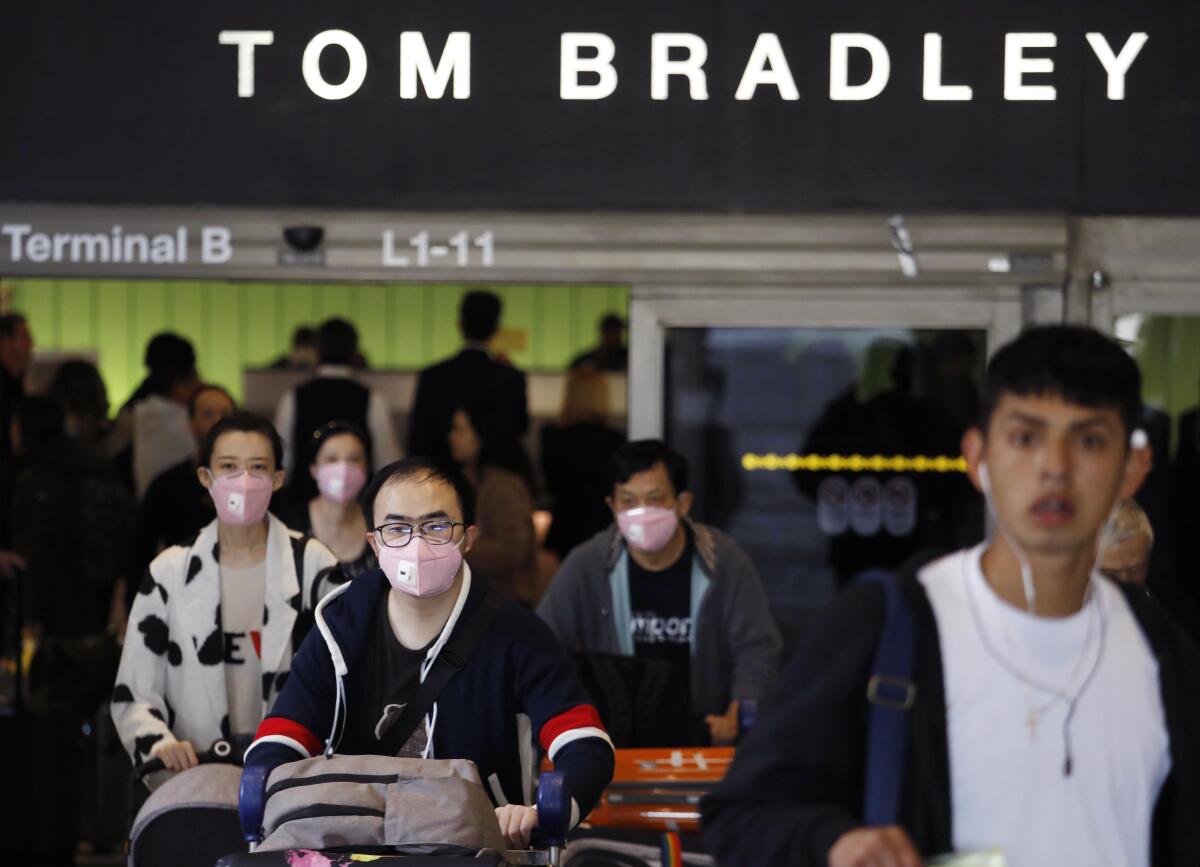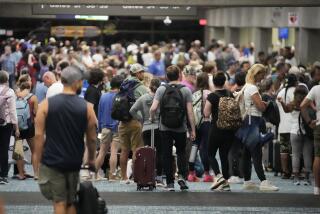Column: Airlines are waiving some fees, but don’t count on a coronavirus refund

- Share via
Paul Schuster purchased tickets in early January to fly from Los Angeles to Seoul on Korean Air this summer.
As the coronavirus spreads worldwide, with South Korea particularly hard-hit, he wants to cancel the trip.
Guess what? Korean Air is slapping Schuster with a $200-per-ticket cancellation fee. On top of that, he’s finding he can’t even reach anyone at the airline to deal with the matter.
I tried as well. Nothing but busy signals Monday. Contact information on the carrier’s website wouldn’t even load.
“What to do?” Schuster asked.
Good question. And Schuster is by no means alone in scrambling to rejigger itineraries amid what some health experts say is a looming global pandemic.
“I’ve heard that reservations are falling off the board, and trips are being canceled left and right,” said Henry Harteveldt, a travel industry analyst at San Francisco’s Atmosphere Research Group.
“Airlines are trying to be accommodating,” he told me, “but they’re giving out refunds only on a case-by-case basis.”
President Trump tweeted Sunday that new screening procedures will be put in place for people traveling from “high-risk countries.”
Vice President Mike Pence, who is overseeing America’s response to the coronavirus, said over the weekend that the United States is heightening a travel advisory for certain regions of South Korea and Italy.
Cases of the virus have been reported in at least 60 countries.
While airlines worldwide — including American, United and Delta — have suspended or reduced service to some of the most hard-hit regions, they’ve only gradually started letting spooked travelers off the hook.
American Airlines announced Sunday it will waive its $200 fee to change travel plans up to 14 days prior to a scheduled trip. However, the waiver applies only to tickets purchased between March 1 and March 16.
JetBlue and Alaska Airlines have announced similar moves. Southwest doesn’t charge change fees.
Delta said Monday it will waive change fees only for international flights and only for tickets issued this month.
It’s unclear at this point how many airline passengers are trying to reschedule or cancel trips because of the coronavirus. Thousands of flights, mainly to China, have been called off by airlines.
The Global Business Travel Assn. said last week that nearly two-thirds of member companies have reported canceling at least “a few” meetings or events. A fifth of survey respondents said they’ve skipped “many” events.
The trade group estimates the coronavirus could cost the worldwide business travel industry almost $47 billion a month.
“It is clear that the coronavirus is having a significant — and potentially very costly — effect on our members, their companies and on the overall business travel industry,” said Scott Solombrino, the association’s executive director. “It is fundamentally affecting the way many companies are now doing business.”
Industry analysts expect more carriers to forgo change fees as the virus grows in severity. But if you want the cost of your tickets refunded, you may be out of luck.
While airlines and hotels are showing some flexibility with bookings, they’ve been reluctant to hand money back, even amid a worldwide public health crisis.
Travel insurance may not help. Epidemics are routinely listed among exclusions in most policies.
Moreover, travel insurance typically won’t cover what the industry calls “foreseeable events” — meaning if you can see a problem on the horizon, your policy may not apply.
Most travel insurers designated the coronavirus a “known and foreseeable event” as of late January, around the same time the Centers for Disease Control issued a warning about avoiding nonessential travel to China.
This basically allows insurers to exclude coronavirus-related claims for cancellations from that point onward. If you purchased coverage prior to then, you still may be eligible to submit a claim.
Most travel insurance plans “contain general exclusions from coverage for any loss directly or indirectly due to any loss, condition or event that was known or foreseeable when the plan was purchased, or due to an epidemic,” said Allianz Travel, a leading insurance provider.
Some travel policies include a “cancel for any reason” provision, which would cover you in such circumstances, although you may not be able recover all your travel costs (most, though).
But this level of coverage is generally about 40% more expensive than ordinary travel insurance, so it’s unlikely you’ll find it in your fine print unless you specifically asked for it.
“Travelers should ensure that they know what their policy covers and contact the insurance company directly with questions,” advised the U.S. Travel Insurance Assn.
Harteveldt, the industry analyst, said airlines know that even as they face declines in ticket sales, they’re playing with fire when it comes to passengers’ coronavirus fears.
“They realize that it’s essential for them to maintain customer goodwill right now,” he said.
At this point, Harteveldt said, most carriers will waive fees for people who want to reschedule a flight. Refunds are trickier, he said.
“The airlines have been downplaying this as an option,” Harteveldt observed.
He advised any traveler seeking a refund to politely and calmly ask to speak with a supervisor. Explain your situation and make the case in as straightforward a fashion as possible for why you should get your money back.
Your chances will be better if your trip involves a destination with a relatively significant coronavirus risk, such as China or Italy.
“If you’re just scared of getting on an airplane,” Harteveldt said, “you may be able to reschedule, but you probably won’t be offered a refund.”
If your airline hasn’t yet announced a fee-waiver policy for rescheduling, ask about your options. More than likely, they won’t put up a fight.
And don’t give up if, like Schuster, you can’t get through to a service rep. Airline call centers can be swamped on ordinary days. At the moment, they’re overwhelmed.
Oh, and wash your hands. Even if you aren’t going anywhere, it’ll help.
More to Read
Inside the business of entertainment
The Wide Shot brings you news, analysis and insights on everything from streaming wars to production — and what it all means for the future.
You may occasionally receive promotional content from the Los Angeles Times.











